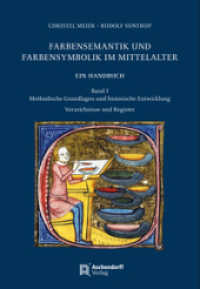Full Description
Based on empirical research, this book closely analyses how European identities are discursively produced. It focuses on discourse from members of a civic association active in promoting democracy and attempting participation in the transnational public sphere.
Unlike previous books that have addressed the question of European identity from top-down stances or through methodological nationalism, this book engages with the multifaceted concept of transnationalism as a key to the negotiation of 'glocal' identities. Applying a discourse historical approach (DHA) through a transnational reading, it shows how grassroots actors/speakers construct their different cultural and political affiliations as both world and European citizens. They negotiate institutional identities and historical discourses of nationhood through new forms of mobility, cultural diversity and the imagination of Europe as a proxy for a cosmopolitan civil society. These discourses are ever more important in a fractured and polarised Europe falling prey to contrary discourses of nationhood and ethnic solidarity.
Highlighting how transnational narratives of solidarity and the de-territorialisation of civic participation can impact on the (re)imagination of the European community beyond tropes like 'Fortress Europe' or intragovernmental politics, this important book shows how identification processes must be read through historical and global as well as localised contexts.
Contents
List of Illustrations
Acknowledgements
Abbreviations
1. Introduction
1.1 The case for investigating the emergence of 'new' European identities
1.2 Book Aims and Objectives
1.3 Structure of the book
1.4 Socio-political contextualisation: The European civil society
1.5 Background on the organization
2. Exploring Identities in Discourse: Conceptual Tools
2.1 A 'late modern' approach to identities
2.2 Investigating identities through language
2.3 Critical approaches: discourse and identity in CDA
2.3.1 The discursive construction of national identities
2.4 European identity: 'national' discourses in transformation?
2.4.1 European identity as a political project
2.4.2 European Identity as a global process and transnationalism as a new variable
3. Unpacking Transnationalism
3.1.1.1 Identification processes in transnational settings: new meanings of community
3.1.1.2 Language
3.1.1.3 Citizenship
3.1.1.4 Solidarity
3.1.2 The role of networks in transnational and cosmopolitan imaginaries
3.1.3 Transnational and cosmopolitan views of the world
3.2 The transnationalisation of the European field
3.2.1.1 The European Public Sphere (EPS)
3.2.2 Transnationalism in Europe from CDS perspectives
4. Operationalizing the Methodological Approach
4.1 Discussion of methods used in this study
4.1.1 Preparation work
4.1.2 The role of moderators
4.2 DATA COLLECTION
4.2.1 Data collected via focus groups
4.2.1.1 London focus group (pilot test)
4.2.1.2 Bologna (Italy) focus group
4.2.1.3 Cluj-Napoca (Romania) focus group
4.2.1.4 Cardiff (UK) focus group
4.2.2 Data collected via individual interviews
4.2.3 Data entextualisation
4.3 ANALYTICAL FRAMEWORK
4.3.1 Thematic analysis
4.3.2 'In-depth' analysis
4.3.2.1 Micro linguistic analysis
4.4 Reflections on the analytical framework
5. Results
5.1 Introduction
5.2 THEMATIC ANALYSIS
5.2.1 Preliminary overview of topics and interdiscursive dimensions of European identities
5.2.1.1 First dimension of production of Europeanness
5.2.1.2 Second dimension of production of Europeanness
5.2.1.3 Attribution of Europeanness: usage of the term European
5.3 IN-DEPTH ANALYSIS
5.3.1 Strategies, topoi, and linguistic realisations
5.3.1.1 On the distribution of strategies and topoi
5.3.2 Macro strategies of defining European identity
5.3.2.1 Strategies of negotiating the meaning of (European) identities
5.3.3 Strategies of constructing European identity
5.3.3.1 Topoi of interactional experience and relationality
5.3.3.2 Topos of (inter)connectedness
5.3.3.3 Topos of membership
5.3.3.4 Strategies of negotiation between European and other identities
5.3.4 Macro strategies of dismantling nationhood
5.3.4.1 Topos of nationalism
5.3.4.2 Topoi of flow and container
5.3.4.3 Topos of inadequacy and global risk
5.3.5 The construction and transformation of communities, spaces, and social orders
5.3.5.1 Topos of network
5.3.5.2 Topos of imagination
5.3.5.3 Topos of (transnational) 'active' citizenship
5.3.5.4 Topoi of transnational democratic dialogue and equal participation
5.3.5.5 Topos of values
5.3.5.6 Topos of solidarity
5.3.5.7 Topos of diversity
5.3.5.8 Topoi of language(s) and multilingualism
6. Discussing and Summarising the Findings
6.1.1 Strategies and topoi
6.1.2 Linguistic Realisations
6.1.3 Metaphorical scenario of spatial dynamics
6.1.4 The indexicality of Europe and nationhood
6.1.5 A transnational conceptualisation of Europeanness
7. Conclusions
7.1 Summary of this study
7.2 Contribution of this study
7.3 Limitations of this study
7.4 Where to now?
Notes
Bibliography
Appendix
1.1 Transcription conventions used in this study
Index








